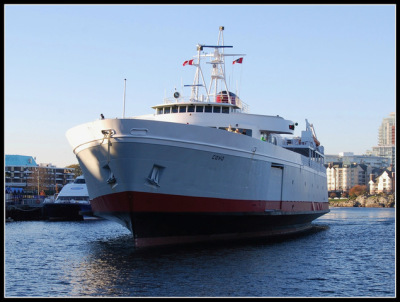Outpost memo: Will this 60-y-o small business survive to see Labor Day 2021?
Typically on Labor Day, the small sea port city of Port Angeles is having the final push for summer tourism. The Olympic Mountains are on glorious display; the early fog along the Strait of Juan de Fuca, burns off by mid-morning, and the Olympic National Park beckons travelers to explore the woodland trails.

Port Angeles, Washington, is the largest city on the Olympic Peninsula. It is the gateway to some of the most remote and scenic wonderlands in the world. In a typical year, three million visitors bring their cameras and their pocketbooks to enjoy the scenery and the fresh seafood caught in the nearby saltwater. Tourism wasn’t always the main employer in this region of tall timber and mighty seas — it was logging and fishing, paper manufacturing and forest products. But as resources thinned, so did those employment opportunities.
What was left to the remaining residents was the beauty that surrounded them, and the annual tourists who made the pilgrimage to see for themselves the stunning vistas, old growth timber, rainforests, and ocean beaches. Over the last decade, small businesses have come to rent spaces in the depleted, but classically historic downtown. Artisans with blown glass creations, boutique clothing stores, and specialty ale breweries have catered to the expensive tastes of visiting clientele.
Just as the wind of financial solvency was picking up and Instagram was bringing a younger set of tourists to the region, Covid-19 struck and Washington state clamped down on non-essential businesses — closing them for months. Then came the biggest financial blow from across the Strait of Juan de Fuca — Victoria, British Columbia. When Canada decided to close the borders, this meant the huge Coho ferry that brought daily boat loads of tourists from all parts of Canada and international travelers, would not be running. In a tourism-dependent economy, this has been devastating. In 2019 alone, the ferry traffic brought $64 million to Port Angeles and county residents.
Shopkeepers, local hotels, restaurants and tour companies hoped the Canadian border would open at the same time Washington State was gradually allowed to open. But the Canadian border remained closed — and it appears that it will not reopen soon. Will local tourism dollars sink along with the Coho ferry’s finances?
One of the board members for Port Angeles’ Chamber of Commerce commented that having the Coho ferry service halted is like have Seattle’s Space Needle removed. The Coho ferry is a local icon — as steady as her schedule, the Coho employed local residents since its christening in 1959. Without the inflow of tourists, and with Covid changing many people’s travel plans, Port Angeles tourism is a fraction of normal. This is doubly hard since many businesses must wait until next tourist season for sales. Finances are already stretched tight for many local residents. Some have closed indefinitely.
Throughout the tourism months of March through October, all of the local county fairs that bring in tourists have had to be cancelled. The spring time Lavender Festival was cancelled — typically bringing 35,000 visitors. And the October Crab Fest, which brings in 25,000 people, was also cancelled. The oldest continuing festival in Washington State, the Sequim Irrigation Festival, was cancelled for this first time in 125 years. Local residents have weathered the economic challenges before, but Covid-19 brought a whole new concern to a region with limited resources.
Labor Day may signal the end of summer time tourism, but will it also end the legacy of the Coho ferry’s service to and from Canada? After 61 years of ferry service, it has never sat idle this long. The financial losses are as deep as the Strait of Juan de Fuca that the ship used to cross numerous times a day. The Black Ball Ferry line — who owns and operates the Coho, is doing all they can do to hang on, but the decision to operate is resting on the Canadian government, who is not inclined to risk bringing Covid across the border.
As our nation celebrates Labor Day, this is one for the record books — the Washington Post reports that over 100,000 small businesses across the nation have already closed for good. Port Angeles shopkeepers wonder if they can hang on to see another Labor Day.
Karen Farris saw the need to help underserved kids while serving in a youth ministry that gave her the opportunity to visit rural schools on the Olympic Peninsula. She now volunteers her time grant writing to bring resources to kids in need. She also shares stories of faith in action for those needing a dose of hope on her weekly blog, Friday Tidings.www.fridaytidings.com




















